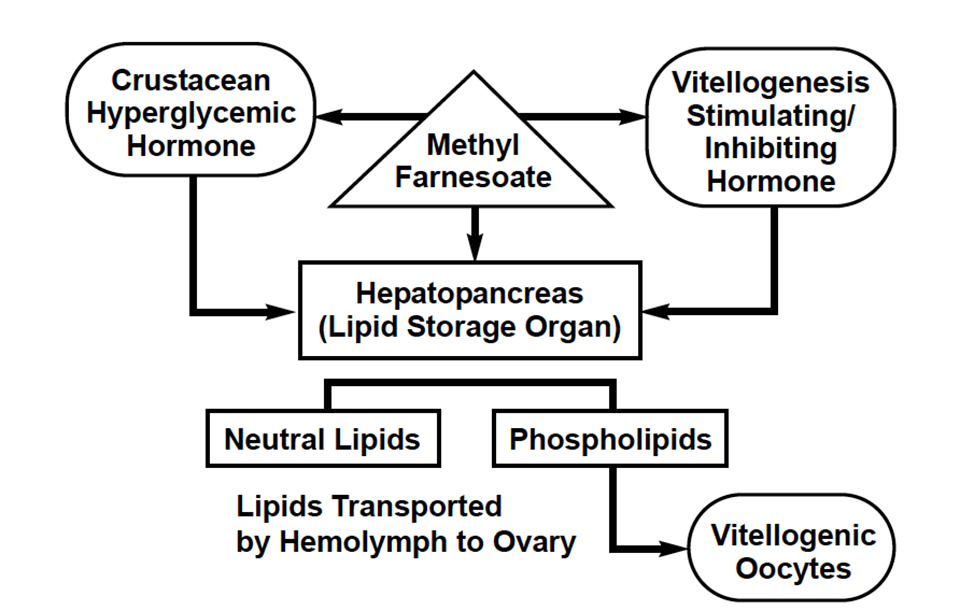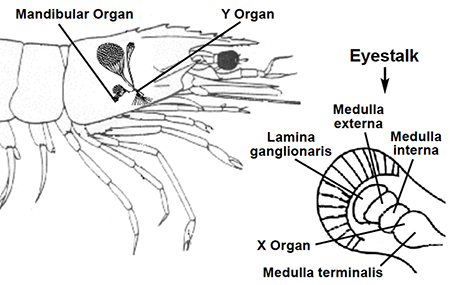
The possible modes of hormone interaction during reproduction and lipid metabolism are many.The relationship between nutrition and hormone function and control (endocrinology) is one of the least known areas of crustacean and shrimp biology. In most decapod crustaceans – including shrimp, crabs, and lobsters – the physiological processes of metamorphosis, molting, and reproduction are inextricably linked and controlled by hormones.
Crustaceans can not synthesize sterols (including cholesterol, a metabolic precursor of steroid hormones; molting hormones; bile acids; and vitamin D3) and phospholipids de novo. They consequently have an essential dietary requirement for these nutrients.
Shrimp endocrine system
The shrimp endocrine system (Fig. 1) consists of both neurosecretory cells and classic endocrine glands, including:
- The eye stalk, which contains several so-called “X organs,” including the medulla externa, medulla interna, medulla terminalis, sensory pore, neurohemal organ, and sinus gland.
- The postcommisural and pericardeal organs.
- The generalized neurosecretory system (except the eyestalk).
- The Y organ, which secretes molting hormone.
- The mandibular organ, which secretes a JH-like compound known as methyl farnesoate (MF), a hormone responsible for the development of juvenile characteristics. Studies on dietary supplementation with MF carried out in a commercial shrimp hatchery in Ecuador using L. vannamei greatly improved the fertility of both eyestalk-intact and ablated MF-stimulated shrimp.
Important hormones
Eyestalk optic ganglia

The optic ganglia in the eyestalks of shrimp synthesize several peptide hormones that play important roles in controlling growth and reproduction. This hormone family includes the crustacean hyperglycemic hormone, molt-inhibiting hormone, growth-inhibiting hormone, vitellogenesis-inhibiting hormone, red pigment-concentrating hormone, and distal-retinal pigment hormone. Other neurotransmitters and neuromodulators like serotonin and norepinephrin are also in this family.
Molting hormone
Shrimp molting is controlled by the eyestalk system and the Y-organ (endocrine gland) through the production of the hormone ß-ecdysone, the precursor of 20-hydroxyecdysone, which is responsible for molting. Since growth in shrimp occurs through molting, there is much interest in its potential control. Controlling molting in shrimp clearly would be of great economic relevance, especially if soft-shelled shrimp that did not require deshelling during processing could be produced.
Control of pigmentation
Hormonal control of color change, a process mediated by concentrating and dispersing hormones, is also an important aspect in shrimp aquaculture. Shrimp coloration is determined by pigments in the exoskeleton and by chromatophores, star-shaped cells that contain different pigments, in the epidermis underneath.
Hormones known to be involved include the red pigment-concentrating hormone, distal-retinal pigment hormone in the eye, dark-adapting pigment hormone, mela-nophore-dispersing hormone and hormones that control proximal and reflecting pigments.
Metabolic hormones
Metabolic hormones include the crustacean cardioactive peptide, produced by the thoracic ganglion and involved in immunoreactivity, and the crustacean hyperglycemic hormone (CCH) produced by the X organ but released by the sinus gland. CHH regulates the release of glucose from the hepatopancreas, and is known to undergo daily fluctuation with a small peak in the morning and a large peak at night. Short-term starvation, stress, or high temperatures can increase the production and release of CHH.
Androgenic hormone
Produced by the androgenic glands and present only in male shrimp, androgenic hormone is responsible for the development of masculine characteristics, including gonads and spermatogenesis.
Vitellogenesis-inhibiting hormone
Recently, much attention has focused on vitellogenin, the precursor to the egg yolk protein vitellin. Vitellin, a lipo-glycocarotenoprotein with a high molecular weight, is the major yolk protein of mature shrimp eggs. With 28 to 35 percent lipid, vitellin is the primary source of lipid for membrane formation and energy storage for developing nauplii.
Conclusion
The control of hormone production in shrimp and other economically important decapod crustaceans is still not well understood. Through improved nutrition and feeding/production techniques, the shrimp endocrine system could be controlled and manipulated to improve reproductive and growth performance under commercial culture conditions.
(Editor’s Note: This article was originally published in the August 2002 print edition of the Global Aquaculture Advocate.)
Now that you've finished reading the article ...
… we hope you’ll consider supporting our mission to document the evolution of the global aquaculture industry and share our vast network of contributors’ expansive knowledge every week.
By becoming a Global Seafood Alliance member, you’re ensuring that all of the pre-competitive work we do through member benefits, resources and events can continue. Individual membership costs just $50 a year. GSA individual and corporate members receive complimentary access to a series of GOAL virtual events beginning in April. Join now.
Not a GSA member? Join us.
Authors
-

Albert G.J. Tacon, Ph.D.
Aquatic Farms Ltd.
49-139 Kamehameha Highway
Kaneohe, Hawaii 96744 USA -
Sergio F. Nates, Ph.D.
Zeigler Brothers, Inc.
Gardners, Pennsylvania, USA
Tagged With
Related Posts

Health & Welfare
A look at aquaculture genomics
Advances in genomics assist aquaculture science by deepening the understanding of adaptation, physiology and quantitative genetics.

Health & Welfare
China’s tilapia germplasm: Chance and challenge
China’s expansive tilapia culture industry is based on exotic species introduced continuously since 1956. Technical advances for improving the limited germplasm are expected to aid the industry.

Health & Welfare
Genetics, environment define crustacean color
Coloration in crustaceans is affected by a combination of factors: diet, environment and genetics. The genes required for coloration are not present in any other animal, but crustaceans use them to create a variety of colors and shell patterns.

Health & Welfare
Recombinant fish growth hormones
The enhancement of growth rate is a particularly important economic parameter, as it can significantly reduce the time required to produce market-size fish.


